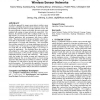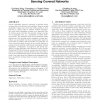86 search results - page 15 / 18 » Jamming and sensing of encrypted wireless ad hoc networks |
WINET
2011
13 years 5 months ago
2011
Sleep scheduling, which is putting some sensor nodes into sleep mode without harming network functionality, is a common method to reduce energy consumption in dense wireless sensor...
ECRTS
2007
IEEE
14 years 5 months ago
2007
IEEE
Since wireless ad-hoc networks use shared communication medium, accesses to the medium must be coordinated to avoid packet collisions. Transmission scheduling algorithms allocate ...
SENSYS
2003
ACM
14 years 4 months ago
2003
ACM
An effective approach for energy conservation in wireless sensor networks is scheduling sleep intervals for extraneous nodes, while the remaining nodes stay active to provide cont...
MOBIHOC
2004
ACM
14 years 10 months ago
2004
ACM
Greedy geographic routing is attractive in wireless sensor networks due to its efficiency and scalability. However, greedy geographic routing may incur long routing paths or even ...
WINET
2010
13 years 9 months ago
2010
Wireless sensor networks comprise typically dense deployments of large networks of small wireless capable sensor devices. In such networks, multicast is a fundamental routing servi...


